Brighton & Hove Albion
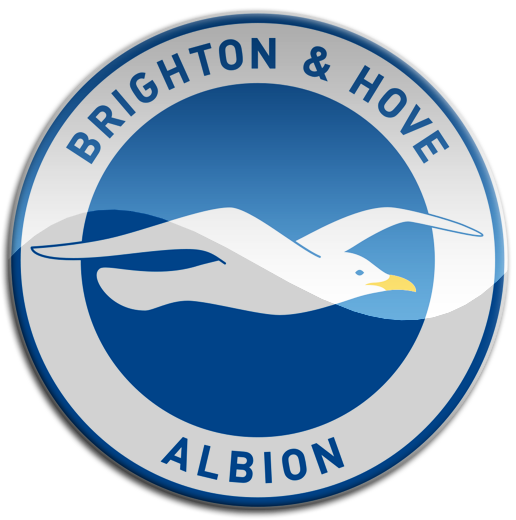
Details
- Name: Brighton & Hove Albion
- Nickname: The Seagulls / Albion
- Founded: 1901
- Ground: American Express Community Stadium (Falmer Stadium)
- Ground capacity: 30,750
American Express Community Stadium
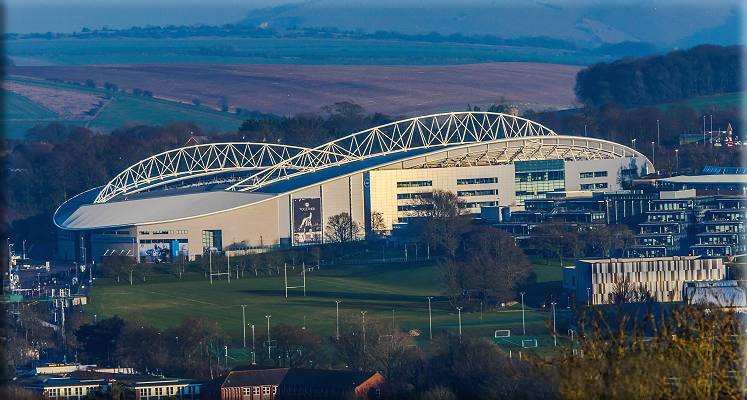
For many years Brighton and Hove Albion were based at the Goldstone Ground in Hove, until the board of directors decided to sell the stadium. The sale, implemented by majority shareholder Bill Archer and his chief executive David Bellotti, proved controversial, and the move provoked widespread protests against the board. The club received little if any money from this sale.
In their last season at the Goldstone, 1996–97, the Seagulls were in danger of relegation from the Football League. They won their final game at the Goldstone against Doncaster Rovers,[9] setting up a winner-takes-all relegation game at Hereford United, who were level on points with the Seagulls. Brighton drew 1–1, and Hereford were relegated to the Football Conference on goals scored.
For two years, from 1997–99, the club shared Priestfield Stadium, the ground of Gillingham, before returning to Brighton to play at Withdean Stadium. This is not predominantly a football ground, having been used for athletics throughout most of its history, and previously as a zoo.
Because of the cost of the public enquiry into planning permission for a new stadium, rent on Withdean Stadium, fees paid to use Gillingham's Priestfield Stadium, and a general running deficit due to the low ticket sales inherent with a small ground, the club had an accumulated deficit of £9.5 million in 2004. The board of directors paid £7 million of this; the other £2.5 million had to be raised from the operations of the club.
In an effort to achieve this, a fund-raising appeal known as the Alive and Kicking Fund was started, with everything from nude Christmas Cards featuring the players to a CD single being released to raise cash. On 9 January 2005 this fund-raising single 'Tom Hark' went straight in at number 17 in the UK chart, gaining it national airplay on BBC Radio 1.
On 28 October 2005 the Office of the Deputy Prime Minister announced that the application for Falmer had been successful, much to the joy and relief of all the fans. Lewes District Council contested John Prescott's decision to approve planning permission for Falmer, forcing a judicial review.
This was based on a minor error in Prescott's original approval which neglected to state that some car parking for the stadium is in the Lewes district as opposed to the Brighton & Hove unitary authority. This caused further delay. Once the judicial review ruled in favour of the stadium, Lewes District Council said that it would not launch any further appeals.
Building of Falmer Stadium started in December 2008. On 31 May 2011 the club officially completed the handover and was given the keys to the stadium with an initial capacity of 22,374 seats, signifying the end of 12 years without a home. During January 2012, the club submitted an application to Brighton and Hove City council to increase the stadium capacity by a further 8,000 seats as well as to add additional corporate boxes, new television facilities and a luxury suite.
This was granted unanimously by Brighton & Hove City Council's planning committee on 25 April 2012. The stadium was then expanded to 27,250 for the start of the 2012–13 season and then further to 27,750 during December 2012 before reaching 30,750 during May 2013.
The History:
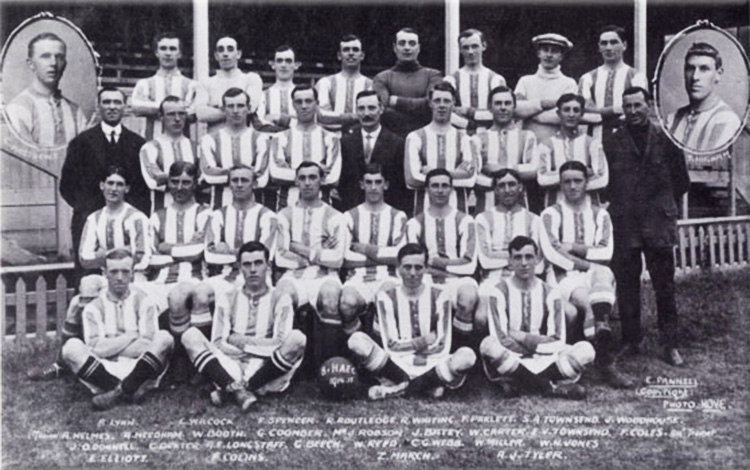
Brighton & Hove Albion F.C. were founded in 1901 and 19 years later, in 1920, they were elected to the Football League's new Third Division — having previously been members of the Southern League. In the Southern League they won their only national honour to date, the FA Charity Shield, which at that time was contested by the champions of the Southern League, and the Football League, by defeating Football League Champions Aston Villa in 1910.
Mike Bamber was the chairman of Brighton from October 1972 until 1983. He famously brought Brian Clough to the club in 1973 and later appointed former England player Alan Mullery as manager. Brighton's life as a Football League club had brought little in the way of success and headlines until 1979, when, under Mullery's management, they were promoted to the First Division as Second Division runners-up.
The 1982/83 season saw a wildly inconsistent start for the club, with victories over Arsenal and Manchester United mixed in with heavy defeats. Manager Mike Bailey eventually lost his job at the start of December 1982. Jimmy Melia took over as manager, but was unable to turn the situation around and Brighton, after four seasons in the top flight, were relegated in 1983, finishing in bottom place.
Despite their relegation, that season Brighton reached their first (and only to date) FA Cup final and drew 2–2 with Manchester United in the first match. Brighton's goals were scored by Gordon Smith and Gary Stevens. This was the final that featured the "miss" by Gordon Smith with virtually the last kick of the game in extra time, prompting the BBC commentator Peter Jones to utter the well known phrase "...and Smith must score". However, Smith's kick was actually saved by the Manchester United goalkeeper, Gary Bailey. In the replay, Manchester United won 4–0.
After four seasons, relegation to Division Three came in 1987, but the Albion bounced back the next season. In 1991 they lost the play-off final at Wembley to Notts County 3-1, only to be relegated the next season to the newly named Division Two. In 1996 further relegation came to Division Three. The club's financial situation was becoming increasingly precarious, and the club's directors decided that the Goldstone Ground would have to be sold to pay off some of the club's huge debts. Manager Jimmy Case was sacked after a terrible start to 1996–97 saw Brighton stuck the bottom of the league by a considerable margin – they seemed certain to be relegated from the Football League just 14 years after they had almost won the FA Cup.
The club's directors, who appeared to have little concern about the on-field fortunes of the club, appointed a relative unknown in Steve Gritt, the former joint manager of Charlton Athletic, in hope of performing a miracle survival. Brighton's league form steadily improved under Gritt, although their improving chances of survival were put under further threat by a two-point deduction imposed as punishment for a pitch invasion by fans who were protesting against the sale of the Goldstone ground. A lifelong fan named Dick Knight took control of the club in 1997 having led the fan pressure to oust the previous board following their sale of the club's Goldstone Ground to property developers.
By the last day of the season, after being 13 points adrift at one stage, they were off the bottom of the table and had to play the team directly below them, Hereford United — the game was in their hands. If Brighton won or drew, they would be safe. Brighton defender Kerry Mayo scored an own goal in the first half and it looked as though their 77-year league career was over. But a late goal from Robbie Reinelt saved the day, Brighton retained their league status on goal difference, and Hereford's 25-year league run was instead over.
The sale of the Goldstone ground went through in 1997, leading to Brighton having to play some 70 miles away at Gillingham's Priestfield stadium for two seasons. Micky Adams was appointed Brighton's manager in 1999. For the start of the 1999–2000 season the Seagulls secured a lease to play home games at Withdean Stadium, a converted athletics track in Brighton owned by the local council. In February 2000 Brighton signed a little known forward on loan from Bristol Rovers called Bobby Zamora. Zamora made an instant impact, scoring in his debut, the 1–1 home draw with Plymouth.
2000–01 was Brighton's first successful season for 13 years. They were crowned champions of Division Three and promoted to Division Two, where they made an excellent start and looked good bets for a second successive promotion. Adams left in October 2001 to work as Dave Bassett's assistant at Leicester, being replaced by former Leicester manager Peter Taylor. The transition proved to be a plus point for Brighton, who maintained their good form and ended the season as Division Two champions – winning a second successive promotion. Just five years after almost succumbing to the double threat of losing their Football League status and going out of business completely, Brighton were one division away from the Premier League.
During May 2009, Knight was replaced as chairman at Brighton by Tony Bloom, who had successfully secured £93 million funding for the new Falmer Stadium and secured 75% shareholding at the club.
Brighton's final season at Withdean was the 2010–11 Season which saw Albion finish as champions of League 1. The final game at Withdean was a 3–2 loss to Huddersfield Town F.C.. For the 2011–12 season, Brighton changed their crest to a design similar to the crest used from the 1970s to the 1990s. This was to reflect on the club returning home after not having a stadium since 1997.
The Amex Stadium hosted its first league match on the opening day of the 2011–12 Season against Doncaster Rovers, who were the last opposition to play at the Goldstone in 1997. The game finished 2–1 to the Albion after being a goal down & saw manager Gus Poyet sent off. The first goal was scored by then-Doncaster player Billy Sharp, while new signing Will Buckley scored both of Brighton's comeback goals. Brighton's first defeat at the Amex came on 27 September losing 3–1 to major rivals Crystal Palace. During the season Brighton hosted some Premier League clubs in cup competitions such as Newcastle United, Sunderland and Liverpool. Brighton finished the season in 10th.
The 2012–13 Season saw Brighton finish 4th and a place in the play-offs in which they would face Crystal Palace. The 1st leg finished 0–0 at Selhurst Park. Palace won the 2nd leg 2–0 at the Amex so Brighton failed to win promotion to the Premier League. Gus Poyet was suspended as manager following controversial comments made in his post-match interview, and was later sacked as manager and replaced by Oscar Garcia.
The 2013–14 Season saw Brighton outside the play-offs for much of the season until a late run of good form put them into the play-off places and on the final day of the season, Brighton beat Nottingham Forest 2–1 with a last minute winner from Leonardo Ulloa securing a 6th-place finish. Brighton faced Derby for the play-off semi-final and lost 2–1 at home in the 1st leg. Brighton lost the 2nd leg 4–1 and crashed out of the play-offs for a second year in a row. Garcia resigned as manager not so long afterwards.
In 2014, the club opened their new training ground in Lancing, regarded as one of the best training grounds in the country.
Ex-Liverpool defender Sami Hyypia was appointed manager for the 2014–15 Season. Hyypia's management saw a combination of poor signings and a lack of leadership with the players, as Brighton entered the relegation zone in November after only 3 wins in 4 months. After a 0–0 draw at Wolves, Sami Hyypia resigned as Manager. Chris Hughton was appointed manager on 31 December 2015. His first game in charge saw Brighton beat Brentford 2–0 in the FA Cup. His first league game in charge saw Brighton beat Charlton 1–0 away. Brighton eventually survived relegation and finished 20th.
On 22 August 2015, the 2015 Shoreham Airshow crash occurred less than a mile from the club's training ground. Among the 11 people killed were Matthew Grimstone and Jacob Schilt, who played for 9th tier side Worthing United F.C.. Matthew Grimstone was a groundsman at Brighton, whilst Jacob Schilt played in a few charity matches for Brighton. A remembrance ceremony was held on 12 September when Brighton played Hull City with tributes being held by both teams, fans and staff.
The 2015–16 Season saw a revived Brighton side go on a 22-game unbeaten run from the opening day to 19 December when Middlesbrough beat Brighton 3–0 at the Amex to inflict Albion's first defeat of the season. During the run, Brighton were top of the Championship for most of the time. On the final day of the season Brighton travelled to Middlesbrough and needed to win to secure promotion to the Premier League in one of the biggest games in Brighton's history.
Middlesbrough took the lead in the first half, however Brighton equalised in the 2nd half through a Dale Stephens header. He was later sent off, as the match finished 1–1 and Middlesbrough won promotion to the Premier League with Brighton having to settle for 3rd and a play-off place. Brighton only missed out on promotion on goal difference by 2 goals.
Brighton faced Sheffield Wednesday in Albion's 3rd play-offs in 4 seasons. Brighton were hit by major bad luck during the 1st leg when 4 players suffered injuries in less than an hour and Albion lost 2–0 at Hillsborough. In the 2nd leg Brighton drew Wednesday 1–1, resulting in a 3–1 aggregate defeat - Brighton's third playoff semi-final defeat in four seasons.
Brighton started 2016–17 with an 18-match unbeaten run, taking them to the top of the league for much of December and January. They stayed in the automatic promotion positions for most of the rest of the season, eventually finishing second behind Newcastle United, earning promotion to the Premier League.
On Monday 13th May 2019, Brighton announced that Chris Hughton had been sacked, with Chairman Tony Bloom stating "Our run of three wins from 23 Premier League matches put our status at significant risk. It is with that in mind, and the performances during that period, that I now feel it's the right time for a change."
"Undoubtedly, this has been one of the most difficult decisions I have had to make as chairman of Brighton, but ultimately one I have made due to how we struggled in the second half of the season."
On 20th May 2019, Graham Potter was appointed head coach of Brighton & Hove Albion, signing a four-year contract.

Roberto De Zerbi - Left
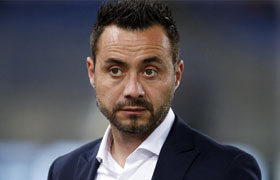
The Facts
Brighton & Hove Albion Football Club is a professional football club based in the city of Brighton and Hove, East Sussex, England, often referred to simply as Brighton.
In the 2017–18 season, the club will play in the Premier League, the top tier of the English football league system, hosting games at the 30,750-capacity Falmer Stadium, known for sponsorship purposes as the American Express Community Stadium, or simply the Amex.
They will make their Premier League debut in the 2017–18 season after sealing automatic promotion from the EFL Championship.
The team is nicknamed the "Seagulls" or "Albion".
The team has historically played in blue and white stripes, though this changed to all white briefly in the 1970s and again to plain blue during the club's most successful spell in the 1980s.
Crystal Palace are considered the club's main rivals, although the grounds are 40 miles apart.
Founded in 1901, Brighton played their early professional football in the Southern League before being elected to the Football League in 1920.
The club enjoyed greatest prominence between 1979 and 1983 when they played in the First Division and reached the 1983 FA Cup Final, losing to Manchester United after a replay and were relegated from the top division in the same season.
Mismanagement brought Brighton close to relegation from the Football League to the Conference which they narrowly avoided in 1997 and 1998.
A boardroom takeover saved Brighton from liquidation, and following successive promotions they returned to the second tier of English football in 2002, from then on playing in the second and third tiers of English football until the conclusion of the 2016–17 season, where the club earned promotion to the Premier League for the first time in their history on 17 April 2017.
This marked the end of a 34-year absence from the top flight of English football for Brighton.
For further information check out their Official website
Notable Players
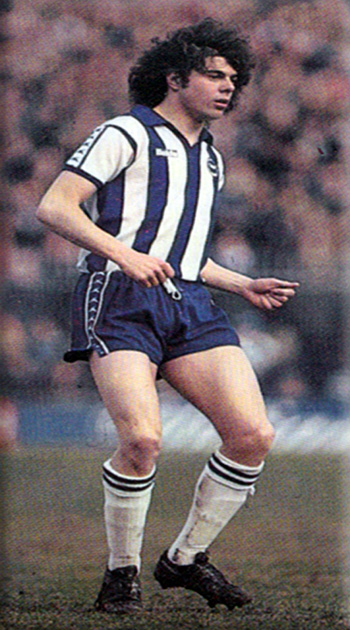
Peter Ward 1975-80 & 82
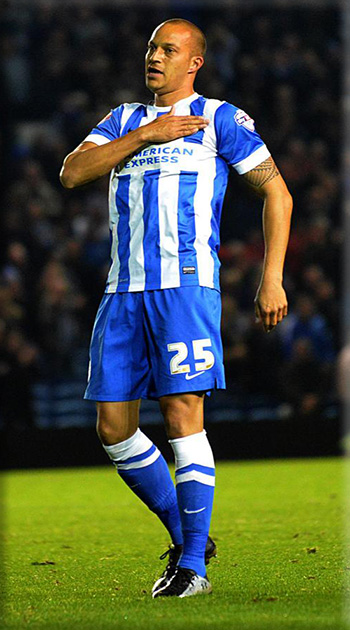
Bobby Zamora 2000-03 & 2015-16
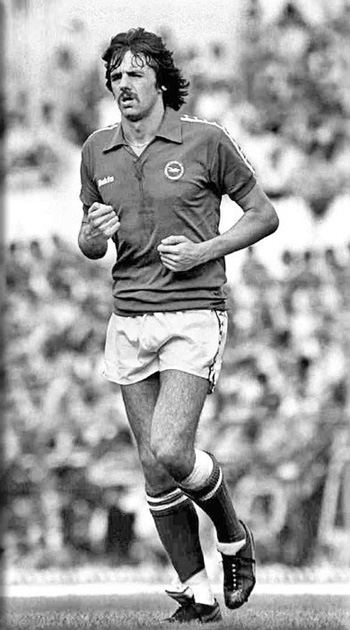
Mark Lawrenson 1977-81
Honours
- League Championship
- Runners-up (1): 2016-17
- League One
- Champions (1): 2010-11
- League Two
- Champions (1): 2001-02
- Runners-up (1): 1978-79
- League Three
- Champions (1): 2000-01
- Runners-up (3): 1971-72,1976-77,1987-88
- League Four
- Champions (1): 1964-65
- Division Three (South)
- Champions (1): 1957-58
- Runners-up (2): 1953-54,1955-56
- FA Cup
- Runners-up (1): 1982-83
- FA Charity Shield
- Winners (1): 1910
- Southern Charity Cup
- Winners (1): 1910
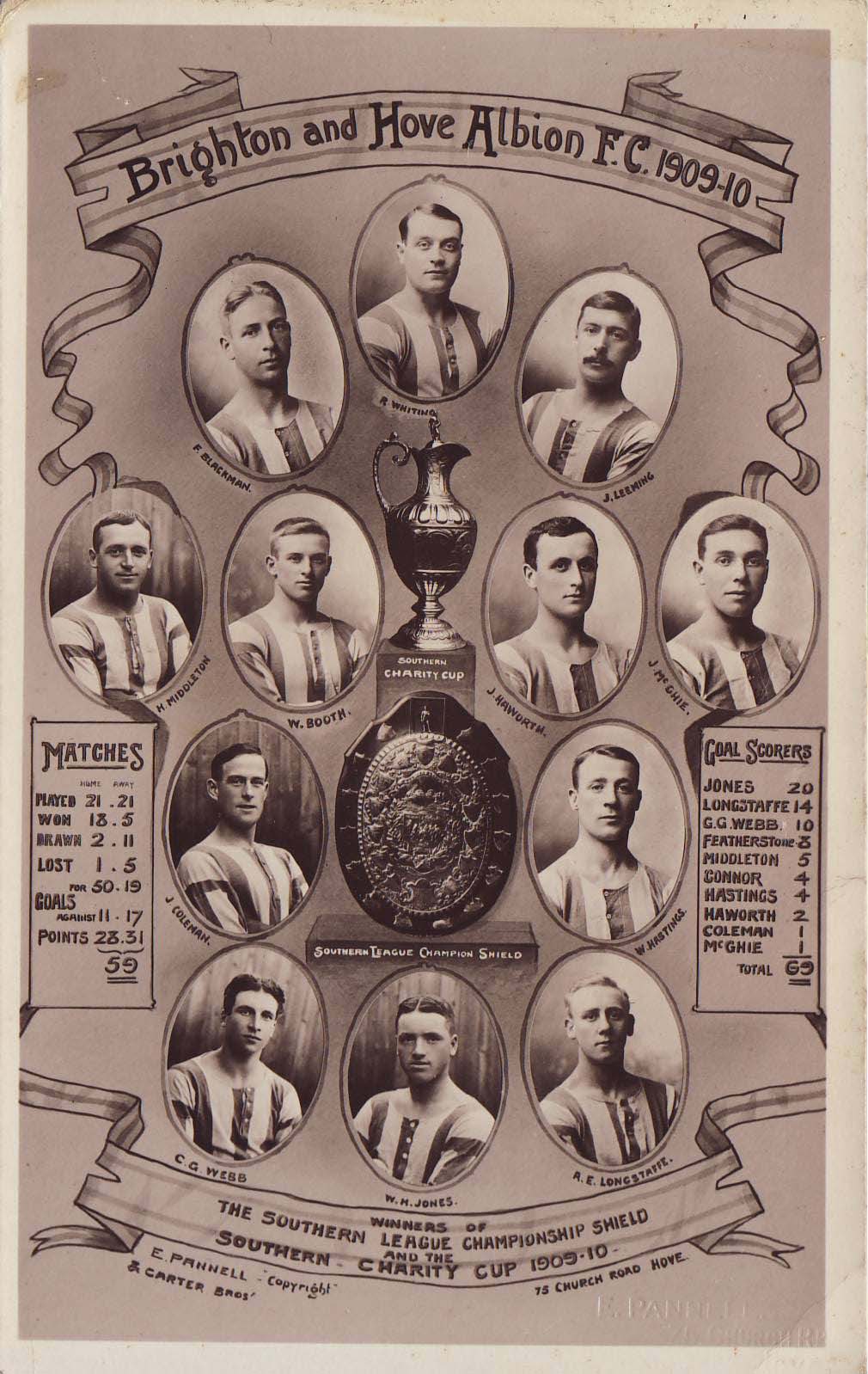
The Brighton & Hove Albion F.C. team of 1909–10, winners of the Southern League title & the Southern Professional Charity Cup



















